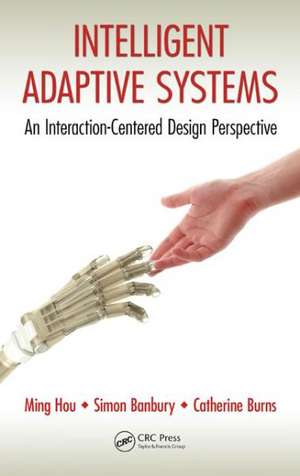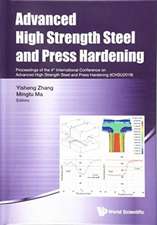Intelligent Adaptive Systems: An Interaction-Centered Design Perspective
Autor Ming Hou, Simon Banbury, Catherine Burnsen Limba Engleză Hardback – 2 dec 2014
The book explores a recognized lack of integration between the HF and HCI research communities, which has led to inconsistencies between the research approaches adopted, and a lack of exploitation of research from one field by the other. The authors integrate theories and methodologies from these domains to provide design recommendations for human–machine developers. They then establish design guidance through the review of conceptual frameworks, analytical methodologies, and design processes for intelligent adaptive systems. The book draws on case studies from the military, medical, and distance learning domains to illustrate intelligent system design to examine lessons learned.
Outlining an interaction-centered perspective for designing an IAS, the book details methodologies for understanding human work in complex environments and offers understanding about why and how optimizing human–machine interaction should be central to the design of IASs. The authors present an analytical and design methodology as well as an implementation strategy that helps you choose the proper design framework for your needs.
| Toate formatele și edițiile | Preț | Express |
|---|---|---|
| Paperback (1) | 352.95 lei 6-8 săpt. | |
| CRC Press – 12 oct 2017 | 352.95 lei 6-8 săpt. | |
| Hardback (1) | 711.19 lei 6-8 săpt. | |
| CRC Press – 2 dec 2014 | 711.19 lei 6-8 săpt. |
Preț: 711.19 lei
Preț vechi: 991.27 lei
-28% Nou
Puncte Express: 1067
Preț estimativ în valută:
136.08€ • 142.47$ • 112.60£
136.08€ • 142.47$ • 112.60£
Carte tipărită la comandă
Livrare economică 05-19 aprilie
Preluare comenzi: 021 569.72.76
Specificații
ISBN-13: 9781466517240
ISBN-10: 1466517247
Pagini: 331
Ilustrații: 85 black & white illustrations, 30 black & white tables
Dimensiuni: 156 x 234 x 25 mm
Greutate: 0.6 kg
Ediția:1
Editura: CRC Press
Colecția CRC Press
ISBN-10: 1466517247
Pagini: 331
Ilustrații: 85 black & white illustrations, 30 black & white tables
Dimensiuni: 156 x 234 x 25 mm
Greutate: 0.6 kg
Ediția:1
Editura: CRC Press
Colecția CRC Press
Public țintă
Professional Practice & DevelopmentCuprins
Introduction. Theoretical Approaches. Introduction to Intelligent Adaptive Systems. Conceptual Frameworks for Intelligent Adaptive Systems. Analysis and Design of Intelligent Adaptive Systems. Analytical Techniques. Agent-based Design Principles. User Monitoring Approaches. Guidance for the Design of Intelligent Adaptive Systems. Practical Applications. Case Studies. Conclusions. Appendix 8 - Courses that may use this as a textbook.
Notă biografică
Dr. Ming Hou is a senior defence scientist at Defence Research and Development Canada (DRDC) Toronto, where he is responsible for providing science-based advice to the Canadian Armed Forces about the investment in and application of advanced technologies for human-machine systems requirements. His research interests include applied cognition, intelligent adaptive interface and systems design, human-technology/automation interaction, intelligent tutoring, and stereoscopic virtual and mixed reality displays. Dr. Hou is the Canadian National Leader of the Human Systems Performance Technical Panel for the Air in The Technical Cooperation Program (TTCP). He also serves several NATO working groups. Dr. Hou is a senior member of the Institute of Electrical and Electronics Engineers (IEEE), a member of the Human Factors and Ergonomics Society, and a member of the Association of Computing Machinery.
Dr. Simon Banbury is the owner and president of Looking Glass HF Inc., an independent Canadian-based human factors consultancy specializing in optimizing how people interact with technology. He is also a Professeur Associé of the School of Psychology at Université Laval (Canada) where he supervises PhD students and supports teamwork and medical decision making research. Dr. Banbury has almost twenty years of human factors consultancy and applied research experience in defence, industrial, and academic domains; he has worked as a human factors consultant in the defence and industrial sectors, as a lecturer of psychology at Cardiff University, and as a defence scientist for the United Kingdom’s Defence Evaluation and Research Agency (DERA).
Dr. Catherine Burns is a systems design engineering professor and the founding director of the Centre for Bioengineering and Biotechnology at the University of Waterloo (Canada). At Waterloo she also directs the Advanced Interface Design Lab. Her research examines user interface design, visualization, and cognitive work analysis and her work has been applied in military, healthcare, power plant control, and oil and gas refining domains. She regularly consults with companies in the areas of human performance in complex systems, interface design, and traditional human factors engineering. Dr. Burns has authored over 200 publications, co-authored a book on ecological interface design, and co-edited Applications of Cognitive Work Analysis. She has been the program chair for the Cognitive Engineering and Decision Making Technical Group of the Human Factors and Ergonomics Society and has been awarded both teaching and research excellence awards at the University of Waterloo.
Dr. Simon Banbury is the owner and president of Looking Glass HF Inc., an independent Canadian-based human factors consultancy specializing in optimizing how people interact with technology. He is also a Professeur Associé of the School of Psychology at Université Laval (Canada) where he supervises PhD students and supports teamwork and medical decision making research. Dr. Banbury has almost twenty years of human factors consultancy and applied research experience in defence, industrial, and academic domains; he has worked as a human factors consultant in the defence and industrial sectors, as a lecturer of psychology at Cardiff University, and as a defence scientist for the United Kingdom’s Defence Evaluation and Research Agency (DERA).
Dr. Catherine Burns is a systems design engineering professor and the founding director of the Centre for Bioengineering and Biotechnology at the University of Waterloo (Canada). At Waterloo she also directs the Advanced Interface Design Lab. Her research examines user interface design, visualization, and cognitive work analysis and her work has been applied in military, healthcare, power plant control, and oil and gas refining domains. She regularly consults with companies in the areas of human performance in complex systems, interface design, and traditional human factors engineering. Dr. Burns has authored over 200 publications, co-authored a book on ecological interface design, and co-edited Applications of Cognitive Work Analysis. She has been the program chair for the Cognitive Engineering and Decision Making Technical Group of the Human Factors and Ergonomics Society and has been awarded both teaching and research excellence awards at the University of Waterloo.
Recenzii
"This book describes the introduction of automation technologies as a revolution in warfare comparable to the atomic bomb, which is almost certainly true. As such the associated changing role of the human in this revolution in warfare and means and methods by which the human interacts with automation is crucial. The book therefore provides a valuable resource by delivering a comprehensive overview of the current state of thinking as well as the issues and methodologies associated with the development of the human component of increasingly automated and autonomous systems."
—Ian Ross, BAE Systems
"An excellent guide to the design of intelligent adaptive systems that will be useful to researchers and systems engineers in a variety of work domains. Comprehensive, easy to read, with many figures and illustrations and case studies of incidents and accidents. Should be on the desk on anyone interested in human factors, systems design, and human-automation interaction."
—Raja Parasuraman, George Mason University, Fairfax, Virginia
"… addresses the most important emerging issue in man-machine systems: the teaming of human and machine intelligence to conduct missions in complex environments. … does an excellent job of reviewing the pertinent literature in order to develop a basic framework for intelligent adaptive systems."
—Mr. Michael J Barnes, US Army Research Laboratory
"Quintessential reading for scientists, engineers, practitioners, designers and anyone interested in building and using 21st century human-computer symbiosis technologies. … A must read for any serious professional in academia, government or industry. This book documents, illustrates and demonstrates the futuristic vision that J.C. Licklider envisioned in 1960 has arrived."
—Dylan Schmorrow, Soar Technology, Inc.
"As an operator of military aircraft, I was fascinated right from the start of the first chapter. Having worked with human factors specialists and the designers of robotic support systems in the past, I thought I had a good idea what I would have liked to see in a book about intelligent adaptive systems. But I was amazed how the authors managed to introduce you to real-world examples, present the available academic knowledge, and then lead you through the best practices for the design of intelligent adaptive systems. They never forget that these IAS should not make humans redundant or present a new burden in a complex and extremely challenging environment. I especially liked the idea about the human-machine interaction as a partnership, since this is what the operators of manned and unmanned aircraft need to be able achieve their greatest potential in a wide range of missions and challenges."
—Roland Runge, German Air Force
—Ian Ross, BAE Systems
"An excellent guide to the design of intelligent adaptive systems that will be useful to researchers and systems engineers in a variety of work domains. Comprehensive, easy to read, with many figures and illustrations and case studies of incidents and accidents. Should be on the desk on anyone interested in human factors, systems design, and human-automation interaction."
—Raja Parasuraman, George Mason University, Fairfax, Virginia
"… addresses the most important emerging issue in man-machine systems: the teaming of human and machine intelligence to conduct missions in complex environments. … does an excellent job of reviewing the pertinent literature in order to develop a basic framework for intelligent adaptive systems."
—Mr. Michael J Barnes, US Army Research Laboratory
"Quintessential reading for scientists, engineers, practitioners, designers and anyone interested in building and using 21st century human-computer symbiosis technologies. … A must read for any serious professional in academia, government or industry. This book documents, illustrates and demonstrates the futuristic vision that J.C. Licklider envisioned in 1960 has arrived."
—Dylan Schmorrow, Soar Technology, Inc.
"As an operator of military aircraft, I was fascinated right from the start of the first chapter. Having worked with human factors specialists and the designers of robotic support systems in the past, I thought I had a good idea what I would have liked to see in a book about intelligent adaptive systems. But I was amazed how the authors managed to introduce you to real-world examples, present the available academic knowledge, and then lead you through the best practices for the design of intelligent adaptive systems. They never forget that these IAS should not make humans redundant or present a new burden in a complex and extremely challenging environment. I especially liked the idea about the human-machine interaction as a partnership, since this is what the operators of manned and unmanned aircraft need to be able achieve their greatest potential in a wide range of missions and challenges."
—Roland Runge, German Air Force
Descriere
A synthesis of recent research and developments on intelligent adaptive systems from the HF (human factors) and HCI (human-computer interaction) domains, this book provides integrated design guidance and recommendations for researchers and system developers. It addresses a recognized lack of integration between the HF and HCI research communities, which has led to inconsistencies between the research approaches adopted, and a lack of exploitation of research from one field by the other. The book establishes design guidance through the review of conceptual frameworks, analytical methodologies, and design processes for intelligent adaptive systems.












